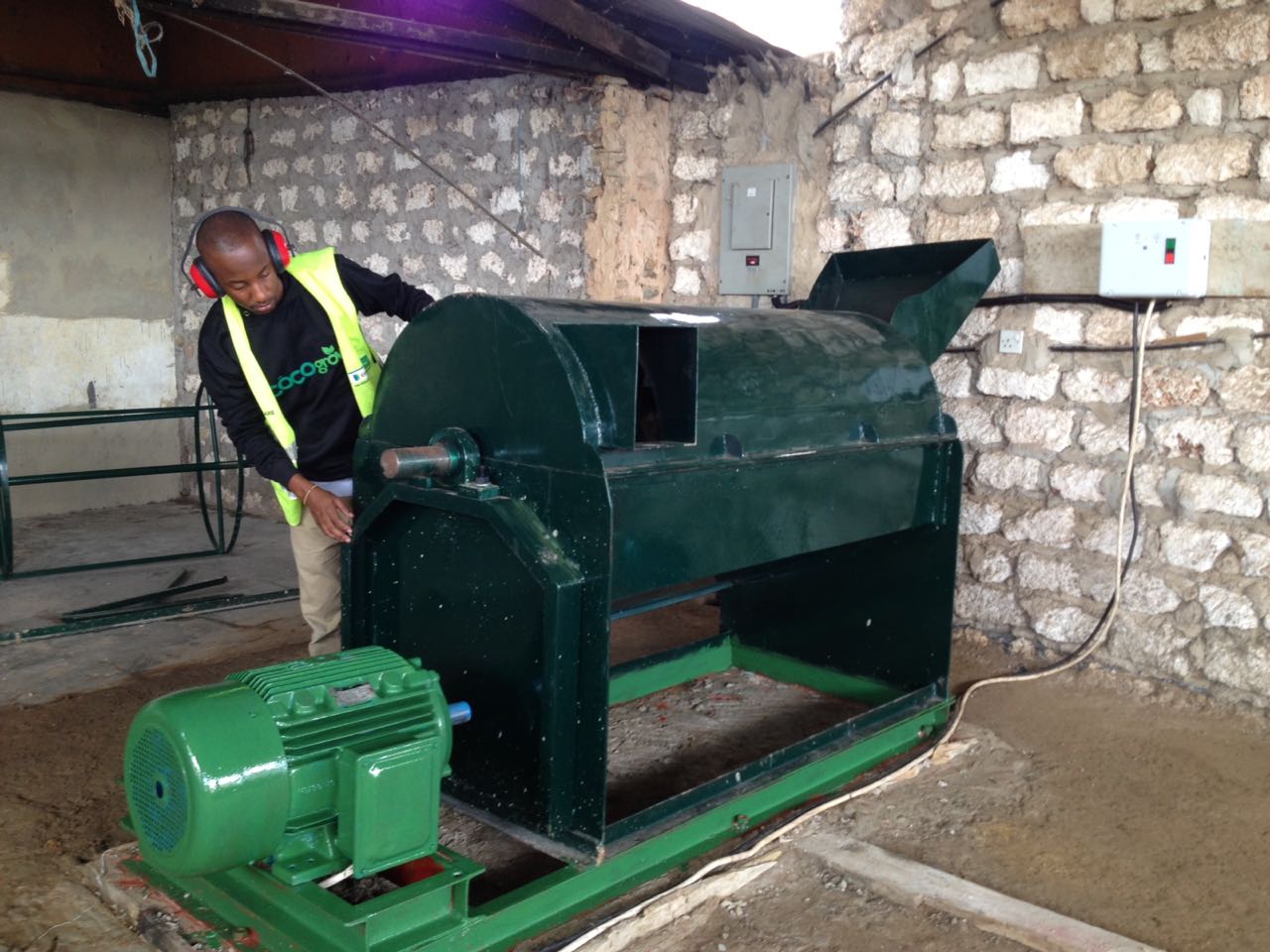
James Kapombe inspecting a machine used to extract coconut husks during installation of the machine at Matiakani, Kilifi County. Photo courtesy.
At 26, James Kapombe Kasemo, is the founder and CEO of CocoGrow, a company he started at the beginning of last year to manufacture coco peat, a soilless growing medium for different horticulture crops. This is after expensively buying the medium before a long waiting for delivery from dealers who imported the product.
Upon graduating from Jomo Kenyatta University of Agriculture and Technology (JKUAT) with Bsc. Actuarial Science in 2014 Kapombe started commercial tomato farming under Casemo Foods, a company which deals in production of various crops in Matiakani, Kilifi County.
The company used to buy coco peat made from coconut husks to germinate and grow tomatoes from dealers who imported the medium from Sri Lanka.
“I could buy the medium at between Sh800 and Sh900 and most of the time I placed orders I was forced to wait for at least two weeks to receive the product. This was expensive and time wasting for our production and market time,” said Kapombe.
The company has been producing the crops until June 2016 when he started conducting a research on coco peats production having driven by curiosity and passion in agribusiness.
RELATED ARTICLE: Mombasa Company invests in coconut husk briquettes to save forests
He wondered how farmers especially from his region could lack healthy planting materials in fear of expensively buying coco peat produced from coconut by-products which the residents burn as waste material.
“The medium offer 100 per cent seed germination as compared to soil and it has high water and nutrient retention capacity of up to 10 times, while also providing optimum aeration for the plants,” said Kapombe.
According to 2003 Philippine Coconut Authority research on utilization of coco peat on coconut production, coco peat is a 100 per cent renewable organic resource for soilless growth medium with 70 per cent water holding capacity and gradually release nutrients to the plant roots due to its alkalinity.
Driven by these benefits and his dream of producing locally available and cheap growing medium for farmers, Kapombe after a successful research decided to rebrand Casemo Foods to CocoGrow in June last year and proceeded to spend his over Sh800,000 savings to establish the company temporarily at Mariakani Town.
“Starting off this company has never been easy. We have been facing electricity problem which has even hindered our movement to a better and bigger operation place within the county.” Said the CEO.
RELATED ARTICLE: Heated human waste to heal Kenya’s sick soil
To officially kick off production in large quantities, the company received production certificate from Kenya Bureau of Standards (KEBS) last month and has since been producing two tonnes per day.
They have further decided to reduce production costs by contracting local engineers who fabricates their production machines instead of importing.
“We love promoting local skills, so we have chosen to hire local experts to make our production machines thus saving us time and money as compared to if we were to import them.”
CocoGrow does their product packaging in a 30 kilogram bags and selling a kilo at Sh33 minus VAT. The company sells the products to traders and farmers in Kericho, Bungoma, Thika, Nairobi and Coastal region among other places on order.
“We have already created a strong customer base in many regions in Kenya owing the value of our product. This has been achieved by attending agricultural events and exhibitions to showcase the product,” said Kapombe.
“On 6-8 last month we attended International Flower Trade and Expo at Oshwal Centre in Nairobi and we are glad that our product received a wide range of acceptance by prospective customers.”
RELATED ARTICLE: Slum dwellers earn from livestock waste briquettes
The company has two permanent employees and six other on a casual basis to help in the daily operations of the company of extracting the long fibres from the coconut husks to realis the coco peats.
“Our products are purely from coconut husks which are high-quality raw materials sourced from our local traders,” said Kapombe.
So far CocoGrow has been featured among the 15 Most Promising Startups at this year’s Nairobi Innovation Week, 2017 Winner Agribusiness Category by E4Impact Foundation and featured in Unleash Innovation Lab, Denmark the same year.
Kapombe is currently on part time pursuing his MBA in Global Business Sustainability and Social Entrepreneurship at Tangaza College in collaboration with Catholic University of Milan.
Before starting a mattress plant using the same coconut by-products, he hopes to move the company to be the leading producer of growing medium in Africa and improve sustainable production in food systems.
“By 2050 Africa will have a doubled population index, and given the average age of an African farmer is 60, we need to seek new ways of crop production and make farming cool for the youth” said Kapombe.
RELATED ARTICLE: Electrician generates light from food waste
Kapombe can be reached on +254 727 977175.